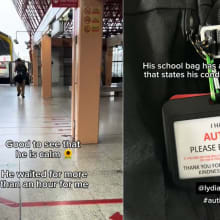Possible shutdown to upgrade Bukit Panjang LRT worries residents, retailers
SINGAPORE — Residents, young parents and businesses in Bukit Panjang have expressed concerns after news emerged that the Government is mulling a shutdown of the town’s ageing Light Rail Transit (LRT) system to carry out major upgrading.
Bukit Panjang residents and shopkeepers have expressed concerns after news surfaced on Monday (Oct 16) that an extensive shutdown was among the options the Government is evaluating for the town's LRT system. Photo: Najeer Yusof/TODAY
SINGAPORE — Residents, young parents and businesses in Bukit Panjang have expressed concerns after news emerged that the Government is mulling a shutdown of the town’s ageing Light Rail Transit (LRT) system to carry out major upgrading.
Analysts said a multi-year shutdown, while painful, might be a better and more cost-effective solution. But some residents interviewed by TODAY said they prefer a gradual upgrade, citing worries about new commuting woes.
Parents with young children, for instance, said it would be harder for them to commute by bus with their prams in tow. Retailers whose shops are located away from the town centre expressed fears that their business will suffer, as residents change their travel patterns.
On Monday, Transport Minister Khaw Boon Wan said an extensive shutdown for major upgrading work was among the options being evaluated for the Bukit Panjang LRT.
“If we want to do serious upgrading — essentially to close it down so that we can re-do the whole tracks and so on, so that we don’t have these ups and downs. And we’re evaluating that proposition,” he told a press briefing to explain the reasons behind the recent underground flooding that paralysed train services along a stretch of the North-South Line.
However, the minister added that he would be “hard put” to take this decision, as it could mean residents going without the LRT service for three years.
The Government will call a tender at the end of this year to fully replace the Bukit Panjang LRT’s ageing components and upgrade its systems. The contract will be awarded by the first half of next year.
The trade-off is between having residents “suffer some pain for a few years” or “prolonging the disruptions and difficulties” on the line for many years, said Dr Walter Theseira, a transport economist with the Singapore University of Social Sciences.
He suggested that it would be preferable to fix the problems by bringing the LRT out of service for a few years, as a gradual upgrade would take longer and be more expensive.
Some Bukit Panjang residents like Madam Long Mei Hong, 34, agreed that a shutdown would be “for the good” of residents if the problems that have dogged the LRT can be fixed at one go.
But the majority of those interviewed by TODAY said they were worried about the impact on their daily routines.
Young parents, for one, pointed out that it would be difficult for them to take strollers on board buses. If the LRT is shut down, Ms Jennifer Ee, 28, said she would likely have to carry her 16-month-old daughter instead, as she does not want to inconvenience others.
“Strollers are not very accessible (on buses),” the housewife added.
Resident Joseph Lim, 28, said the LRT has been an “indispensable mode of transport” for many in the town, despite its faults and service disruptions over the years.
Given Bukit Panjang’s rising population and increasingly busy rush-hour commute, he and other residents were concerned that a shutdown of the LRT would create fresh commuting woes.
“It’s better to have an incremental upgrade — keep the line running while upgrading is carried out,” said Mr Lim, a medical student.
National University of Singapore transport researcher Lee Der-Horng suggested that the authorities could demarcate more bus priority lanes, particularly at major road junctions in the town, to ease worries about congestion if more buses are added.
Given the LRT’s relatively low capacity, more frequent bus services should be able to cope with commuter demand, he said.
Shopkeepers at Fajar Shopping Centre, which is four stops from the town centre, said their business will be hit hard by any major change to commuting patterns in the neighbourhood.
Madam Jenny Yong, 53, manager of Peking Optical & Contact Lens, said four in 10 of her customers are from other parts of the town, such as Petir and Pending. They will likely stop going to her shop if the LRT shuts.
Noting the array of shopping malls elsewhere, she said additional bus services would not help, unless they run parallel to the LRT line. She urged the Government to speed up the upgrade, adding that a three-year shutdown “is a bit too long”.
A manager of a mobile-phone retailer, who declined to be named, said patrons typically visit the shopping centre after work, and one-fifth of the shop’s clientele are from areas like Chua Chu Kang and Bukit Batok.
“I cannot imagine how badly business will be affected … (Closing the LRT) will be a nightmare for many people,” he added.



